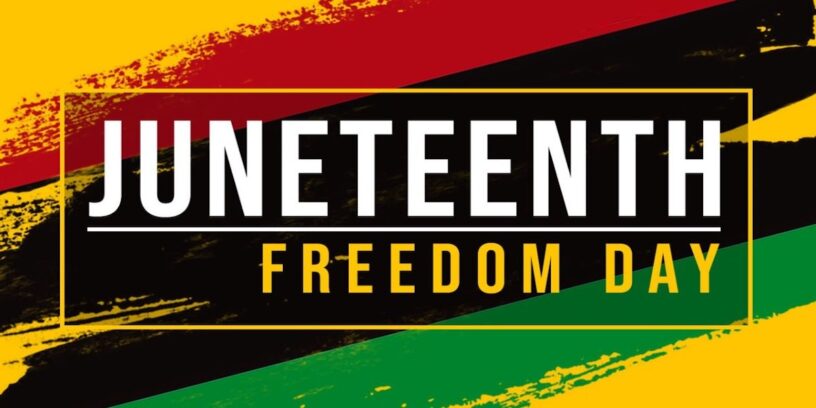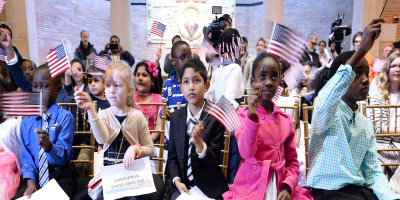Note: This story originally appeared in “Running the Campus” on June 18, 2020.
Tomorrow is Juneteenth, the oldest nationally celebrated commemoration of the end of slavery in the United States, recognizing June 19, 1865, the day that Union General Gordon Granger rode into Galveston, Texas and read a federal decree that all previously enslaved people in the “Lone Star State” were free.
Two-and-a-half years after President Lincoln issued the Emancipation Proclamation.
More than 150 years later, equity and social justice for black people in this nation remain overdue.
I cannot begin to express what it means to be black in America today.
It is not my experience.
If you’d like to hear from a college president whose voice matters far more than mine right now, I strongly encourage you to read this message from Lee Pelton, the president of Emerson College in Boston: “America is on Fire.”
Every word of President Pelton’s searingly personal story is compelling, and if by the end you aren’t challenging yourself with the question he asks, “What are you going to do?” then your heart may not be beating in your chest.
Whatever challenges I may have faced in my life, whatever obstacles I may have overcome, I have not lived a day as a black man in a country with a legacy of slavery, segregation, and systemic racism.
Right now, at this moment in our fraught racial history, I can only listen to those with experience, learn all I can, lend my voice to their efforts, and enact antiracism in my own life, personally and professionally.
I have been blessed in my lifetime to have a father who raised me, and a few other vital father figures who have shaped me.
One of those is Al Bostick, who in 1987 when I was a young college student and aspiring actor in Oklahoma City was the artistic director of the Black Liberated Arts Center (BLAC) and now is known by schools and theatres across the country as the travelling “griot” (a West African storyteller) of Basically Bostick Projects, Inc.
Al has taught me many things about art and life and race over the years. One of his early gifts to me was a book, Black American Literature, edited by Darwin Turner, with an inscription that read, in part, “May you enjoy this, and may it bring you enlightenment—at least on the ‘darker’ side of literature.”
Returning to his gift in recent days, seeking the enlightenment he encouraged among the essays, poems, stories, and plays of Phillis Wheatley, W.E.B. DuBois, Langston Hughes, Zora Neale Hurston, and Paul Laurence Dunbar, I found an essay by Eldridge Cleaver written in 1968, its pages dog-eared and scribbled on in 1988, but its message blazingly important right now in 2020.
In “The White Race and Its Heroes,” taken from his memoir, Soul on Ice, Cleaver describes the phenomenon of white youth in the 1960’s turning away from their traditional, historical heroes and role models—who largely embraced slavery and subjugation of black Americans—and instead, “joining Negro demonstrations in large numbers.”
Beyond carrying signs and chanting slogans, however, Cleaver found some measure of hope in the results some of their protests were achieving, through the Free Speech Movement at the University of California, and through teach-ins and sit-ins across the country.
“From the beginning America has been a schizophrenic nation,” Cleaver writes, “Its two conflicting images of itself were never reconciled, because never before has the survival of its most cherished myths made a reconciliation mandatory.”
To many, the demonstrations in cities large and small across the nation over the past three weeks feel like a similar turning point; a moment in which people of all races protest mistreatment and demand change together.
The precipice of reconciliation.
Tomorrow, as we commemorate Juneteenth, and as those of us who have not had the experience of being black in America listen, learn, and seek to lend our voices and our efforts where they will matter the most, my fervent hope is that we do not waste this moment.
Statements of support for black Americans and other communities of color in the face of systemic racism are essential right now: Black lives matter.
Actions to eliminate racism and create a more just and equitable society for everyone are even more important.
Tomorrow, and in the days that follow, with President Pelton’s challenge, “What are you going to do?” ringing in our ears, here are some actions to consider:
- Learn more by reading articles, essays, stories, poems, and books, like Ibram X. Kendi’s How to Be an Antiracist or Ijeoma Oluo’s So You Want to Talk About Race; by watching movies (13th, The Hate U Give, When They See Us), or listening to Podcasts (Justice in America). If you’re not sure where to start, check with your local library (including here at NECC), or online with recommendation lists like these from New York Magazine and Fortune.
- Discover the advantages and privileges you may, or may not, have experienced in life by taking a short survey from the Ford Foundation and discovering your American Dream Score.
- Seek antiracist organizations to support (with your time, with your talents, or with your financial contributions).
- Let your elected officials know how you feel about specific issues. Not sure who they are? Look up your federal, state, and local elected officials on this USA.gov web site. Not sure what to say? See how you feel about this Ten Point Policy Platform developed by the Massachusetts Black and Latino Legislative Caucus.
Write an editorial.
Attend a demonstration.
Feel your heart beating and let it move you to act.
The moment is now.






